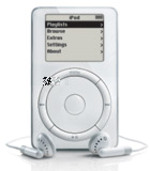I am folding A-Clue.Com into this blog as of January. To celebrate the end of 10 years in e-mail publishing I am posting 5 essays covering the letter’s main topics.
This week I talk about The World of Always On, an idea I considered "the next big boom" after finishing work on my Moore’s Law book, but one that has yet to come to pass. Enjoy.
By all rights we should be in the middle stage of a tech revolution as important as the commercial Internet itself.
I am talking here about what I call The World of Always On. (To the right is the current state of the art in active heart monitors.)
The vision is simple. Extend applications into the air by using 802.11 WiFi routers as application platforms. Use sensors and motes to collect data on our bodies, our homes, and our property, creating new valuable applications that live in the air. Use Internet standards to let you control these applications from anywhere.
I first began exploring this idea in 2003, after the dot-boom went dot-bust. Having explained (for myself if no one else) how progress was inevitable with Moore’s Law, I sought out the new direction it would take.
I was struck by two things. First, how small powerful chips were getting, with line widths reaching the nano-level. Second by the need for people to "age in place," and the monitoring requirements of that.
I posited a true "killer app," a heart monitor linked to an 802.11 router. Perhaps, I speculated, it might have a bluetooth link to a cellphone, so the whole thing could live wherever the user went? At the same time, I noticed, Intel was doing fascinating work with Alzheimer’s patients, creating multi-chip systems that could identify when a patient was acting confused, and when they were not, lowering the load on care-givers.
These stories hit close to home. My best teacher in journalism school,
Dick Schwarzlose, had died of a heart attack while bicycling, which is
my favorite sport. And my next-door neighbor, Frank Flint, had recently
passed away from Alzheimer’s.
I was also thinking of a friend I made here on the Internet, Martin
Bayne. Martin was known as "Mr. Long Term Care" in the 1990s, but now
he was moving into a nursing facility as his symptoms got worse. It is
hell, he said, again and again. I wondered how technology might change
that.
I took my ideas to Stanford in late 2004, where they got a modest hearing. But nothing ever came of it.
Why not?
One reason is that I myself am not an entrepreneur. I’m a
journalist. Doing a story that hasn’t happened yet can sound, on the
surface, to be quite loony. A second reason was that there are
differences between the scale of even today’s mote chips and true
nano-scales – they’re like aircraft carriers in a nano-sea of PT boats.
This means power is a concern. Do you just replace chips and systems
whenever their on-board batteries wear out?
But two other reasons also occurred to me. One is that these systems
would need to collect vast amounts of new data from our environment,
and the privacy laws (as presently constituted) give control of that
data to corporations, not people. A major overhaul of American privacy
was needed, but the Bush Administration was engaged in a concerted
campaign to seize all the data we were already creating for its "War of
Terror."
Just as important, the move of electronic supply to the Far East meant
that only high-volume goods could be created. Imagine if Steve Jobs had
to export his first Apple II before it could be produced – would the PC
revolution have even happened? That is the economic situation we face
now. Confirmation of the industry’s Luddite tendencies came that same
year when Cisco, after finding out one of its 802.11 routers used open
source code (and could thus become a true platform), simply replaced
that model in its line with an identical product that used closed
source.
The good news is that all this led me to ZDNet, which offered
me a part-time position from which I could draw at least a semblance of
a living. But it didn’t, and doesn’t, solve the underlying problem.
Thus I am forced to conclude that Always On is a "canary in the
cold mine" for American technology generally. A decade ago, two decades
ago, three decades ago, logical concept extensions like this would have
been quickly seized by an army of hobbyists and entrepreneurs. Now
those lower rungs on the innovation ladder are gone.
Until they are rebuilt we will continue to fall further behind
the rest of the world. And the crisis of aging will just get worse.













Sounds like all this can give one anxiety issues! In fact after reading your article, i almost had a full blown panic attack. In case this happens to you check out- http://www.youcanstoppanicattacks.com/ Thanx for the clues to the future of always on.
fss
Sounds like all this can give one anxiety issues! In fact after reading your article, i almost had a full blown panic attack. In case this happens to you check out- http://www.youcanstoppanicattacks.com/ Thanx for the clues to the future of always on.
fss